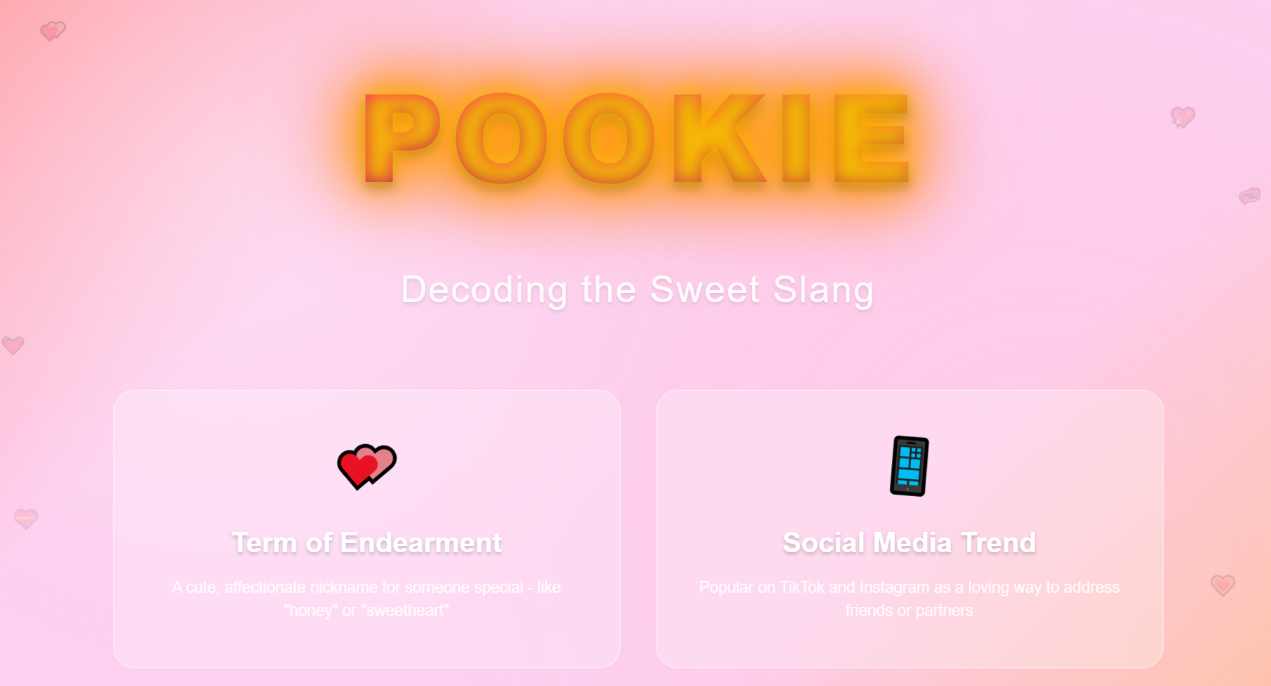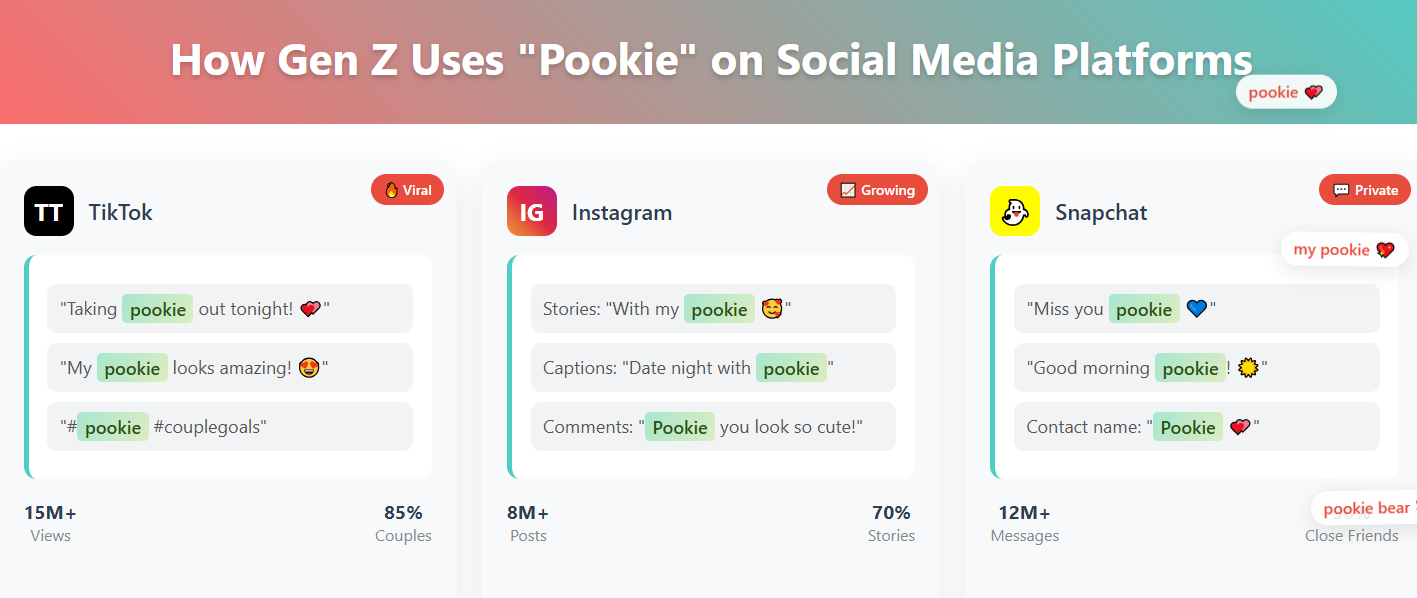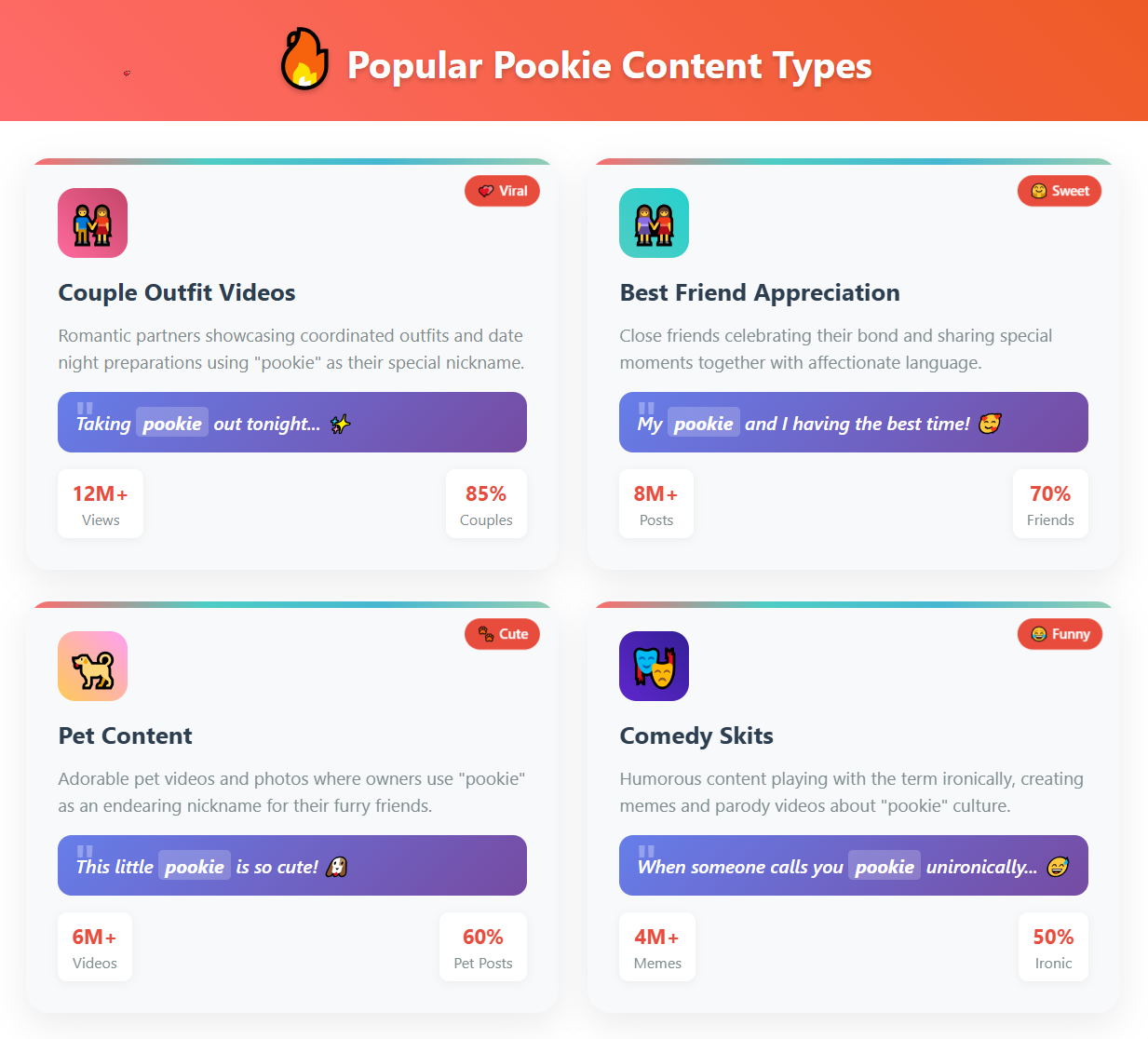"Pookie" is a Gen Z slang term meaning a cute nickname or term of endearment, similar to "sweetie," "honey," or "babe." While generally harmless, this affectionate term has become the most searched Gen Z slang word, leaving many parents confused about their teens' digital conversations. Understanding what "pookie" means helps parents stay connected with their children's evolving language and ensures healthy family communication in our digital age.

Table of Content
Part 1. What Does "Pookie" Actually Mean? Complete Definition
The term "pookie" has surprisingly deep roots that trace back to the 1960s when it first appeared as an affectionate nickname. Originally used by parents for their children, the word gained broader recognition through pop culture, including Garfield's beloved teddy bear named "Pooky." However, the modern usage we see today exploded in 2023 through TikTok and Instagram.
The Simple Definition Every Parent Should Know
At its core, "pookie" is simply a term of endearment that teens use to express affection toward someone they care about. It's no different from calling someone "sweetie" or "honey" - just with a distinctly Gen Z twist. When your teen calls someone their "pookie," they're essentially saying that person is special to them.
From Vintage Pet Name to Viral TikTok Trend
The transformation of "pookie" from a family nickname to viral slang happened thanks to social media influencers like TikTok's Prayag Mishra, who calls himself "Big Pookie," and the popular couple Campbell and Jett Puckett. Jett's affectionate use of "pookie" for his wife in their viral videos introduced millions of teens to this endearing term, making it a staple of Gen Z vocabulary.
Multiple Ways Teens Use "Pookie" Today
Today's teens use "pookie" across different relationship contexts. It might refer to a best friend, romantic partner, family member, or even a beloved pet. The key is understanding that it always carries positive, affectionate connotations. Unlike some slang terms that can have hidden meanings, "pookie" is refreshingly straightforward in its wholesome intent.
Part 2. How Gen Z Uses "Pookie" on Social Media Platforms
Social media has transformed how teens express affection, and "pookie" perfectly captures their desire for authentic, playful communication. On platforms like TikTok, Instagram, and Snapchat, you'll see teens using this term in captions, comments, and direct messages as a way to show closeness without being overly serious.

"Pookie" Trends Across TikTok and Instagram
On TikTok, "pookie" often appears in couple videos, friendship content, and even pet videos. The hashtag #pookie has millions of views, with teens creating content around their "pookie moments" - special times with people they care about. Instagram stories frequently feature "pookie" in casual posts about hanging out with friends or romantic partners.

What It Means When Teens Call Someone "Pookie"
When a teen calls someone "pookie," they're essentially letting that person know they hold a special place in their heart. The context matters though - calling a romantic interest "pookie" suggests deep affection, while using it for friends indicates a close, comfortable relationship. It's worth noting that teens are generally careful about who they call "pookie," reserving it for people they genuinely care about.
Red Flags Parents Should Watch For
While "pookie" itself is innocent, parents should pay attention to the relationships where it's being used. If your teen is calling someone significantly older "pookie," or if the term appears in conversations with strangers online, that might warrant a gentle conversation. The concern isn't the word itself, but rather ensuring your teen's online relationships are appropriate and safe.
Part 3. Why Understanding Teen Slang Matters for Digital Safety
Here's something many parents don't realize: staying current with teen language isn't just about connecting with your kids - it's actually a crucial part of keeping them safe online. When parents understand the terms their teens use, they're better equipped to spot concerning conversations and maintain open communication about digital experiences.
Understanding terms like "pookie" helps parents distinguish between normal teen communication and potentially risky situations. When you know that "pookie" is simply an endearing nickname, you can focus your attention on genuinely concerning language patterns instead of worrying about harmless affection between friends.
But here's where it gets tricky - teen slang evolves incredibly fast. What's popular today might be outdated next month, and new terms can carry meanings that aren't immediately obvious to parents. This rapid evolution can create communication gaps that affect family relationships and your ability to keep your teen safe online.
This is where tools like FamiSafe become valuable for modern families. Rather than trying to memorize every new slang term, FamiSafe helps parents understand their teen's digital communication in context, providing educational insights that help you determine whether a conversation is typical teen interaction or something that requires your attention.
- Set Screen Time & App Rules
- Capture Instant or Scheduled Screenshots
- Web Filter & Safe Search
- Location Tracking & Driving Report
- App Blocker & App Activity Tracker
- YouTube History Monitor & Video Blocker
- Social Media Texts & Porn Images Alerts
- Available on Multiple Platforms
Part 4. Building Healthy Communication About Teen Digital Language
The key to understanding teen slang like "pookie" isn't about learning every new term that emerges. It's about creating an environment where your teen feels comfortable explaining their digital world to you. When you approach their language with curiosity rather than criticism, you open doors to deeper conversations about their online experiences.
Building this kind of trust requires consistency. Rather than dismissing their communication style as "just slang," try to understand what these terms mean within their social context. Ask questions like "What does that word mean to your friends?" This shows genuine interest in their perspective without making them feel judged.
FamiSafe can support these conversations by providing context when you encounter unfamiliar terms in their digital communication. Instead of using it as surveillance, think of it as a translation tool that helps you understand their world better. The goal isn't to monitor every word they use, but to stay connected with their evolving language.
Remember that language is how teens establish their identity and connect with peers. Fighting against natural language evolution creates unnecessary conflict, while understanding it strengthens your relationship with your teen and keeps communication channels open for when they really need your guidance.
Conclusion
Understanding what "pookie" means is really about something bigger - staying connected with your teen's world without invading their privacy. This harmless term of endearment represents the evolving way young people express affection and build relationships in digital spaces.
The most important takeaway isn't memorizing every new slang term, but rather maintaining open, curious communication with your teen about their online experiences. When you approach their language with interest rather than concern, you build the trust necessary for meaningful conversations about digital safety and healthy relationships.
FAQs
-
Q1: What is the meaning of "pookie slang"?
In modern slang, "pookie" is an affectionate nickname, similar to "sweetie" or "darling," popularized by TikTok trends and social media influencers. -
Q2: Does "pookie" mean Virginia?
No, this appears to be a misunderstanding. The mainstream, global meaning of "pookie" has no connection to the state of Virginia. -
Q3: Is "pookie" a bad word?
Typically, no. It is overwhelmingly used as a positive, cute term of endearment. Its standard use is entirely harmless, though context always matters. -
Q4: Who is called Pookie?
Anyone a person feels affection for! This includes a romantic partner, a best friend, a child, or even a pet. It's a versatile term of endearment.



